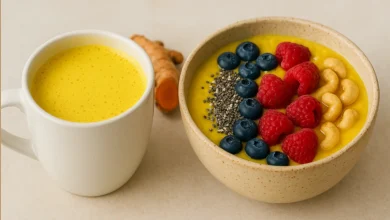
Your body needs the right fuel to fight off illness and stay energized. Inflammation, when chronic, can drain your energy and weaken your immune system. Fortunately, nature provides powerful anti-inflammatory foods that protect your body and restore vitality.
In this guide, you’ll explore which foods reduce inflammation, how they support your immune system, and simple ways to include them in your diet.
What Is Inflammation?
Inflammation is your body’s natural defense against injury or infection. It helps you heal. But when it becomes chronic—caused by poor diet, stress, or pollution—it leads to problems like fatigue, joint pain, and weakened immunity.
That’s where anti-inflammatory foods come in. They cool down internal inflammation and help your body function at its best.
Why Anti-Inflammatory Foods Matter
Eating anti-inflammatory foods helps.
- Strengthen your immune system.
- Increase energy and focus.
- Improve digestion and gut health.
- Lower the risk of chronic diseases.
Instead of reaching for pills or energy drinks, simple food choices can offer long-term benefits.
Top Anti-Inflammatory Foods to Eat Daily
You might also like: How to Heal Your Gut with These Trending Superfoods
1. Leafy Greens
Spinach, kale, and Swiss chard are packed with antioxidants like vitamin C and beta carotene. They help reduce oxidative stress, a major cause of inflammation.
2. Fatty Fish
Salmon, sardines, and mackerel contain omega-3 fatty acids. These healthy fats directly lower inflammation and boost brain function.
3. Berries
Blueberries, strawberries, and raspberries are rich in anthocyanins. These compounds fight inflammation and support your immune system.
4. Turmeric
This golden spice contains curcumin, a strong anti-inflammatory agent. Add it to soups, teas, or smoothies for a daily boost.
5. Ginger
Ginger reduces muscle soreness, supports digestion, and calms inflammatory reactions in the body.
6. Nuts and Seeds
Almonds, walnuts, chia seeds, and flaxseeds contain fiber, healthy fats, and vitamin E. These nutrients protect cells from inflammation.
7. Olive Oil
Extra virgin olive oil is full of heart-healthy fats and anti-inflammatory compounds. Use it in salads or for light cooking.
8. Green Tea
Rich in polyphenols, green tea lowers inflammation and increases metabolic energy. It’s a great coffee alternative.
Foods to Avoid
If you want to reduce inflammation, avoid or limit:
- Sugary drinks and snacks
- Processed meats
- White bread and refined carbs
- Deep-fried foods
- Artificial trans fats
These items trigger inflammation and add stress to your immune system.
Simple Meal Ideas
- Breakfast: Oatmeal with blueberries, chia seeds, and a spoon of almond butter.
- Lunch: Quinoa salad with spinach, avocado, cherry tomatoes, and olive oil.
- Snack: Handful of walnuts and green tea.
- Dinner: Baked salmon with steamed broccoli and turmeric rice.
From the above
Food is a powerful tool for healing. By adding anti-inflammatory ingredients to your plate, you’ll support your immune system and feel more energetic. Focus on whole, natural foods and avoid processed products that increase inflammation.
Small changes can make a big impact. Start today by adding berries, leafy greens, or a cup of green tea to your routine. Your body will thank you.
You might also like: Top 10 Superfoods That Improve Gut Health Naturally
FAQs
Some people feel improvements in energy and digestion within a few days. Long-term benefits come with consistency.
Yes, these foods are safe and beneficial for all ages.
Cooking slightly reduces curcumin content, but it’s still effective. Pair it with black pepper for better absorption.
Green tea, turmeric tea, and water with lemon are great anti-inflammatory drinks.
Yes, they reduce bloating and support fat metabolism naturally.





2 Comments